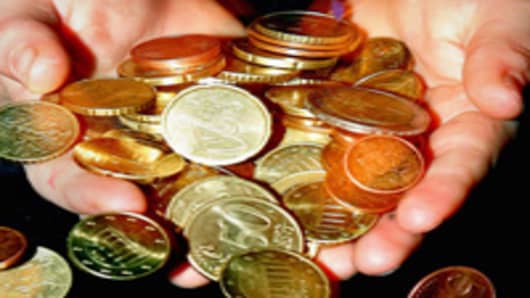
Mcihael Probst
** FILE ** Euro coins fall out of the hands of a person in Frankfurt, central Germany, Feb. 4, 2007. The euro set an all-time high against the dollar Friday, April 27, 2007, buying US$1.3682 as fears about a U.S. economic slowdown mounted amid signs of weak growth. L(AP Photo/Michael Probst)
The slowdown from 0.7 percent growth in the third quarter was mainly a result of a contraction in household and government consumption and a negative impact from inventories, which show companies expect falling demand for their products.
GDP rose 2.2 percent year-on-year, slightly off Eurostat's earlier estimate of 2.3 percent.
But as growth slowed, producer price inflation in January jumped to 0.8 percent month-on-month -- versus 0.1 percent in December -- for a year-on-year gain of 4.9 percent, as expected in a Reuters poll of economists.
"These figures show a combination of moderating economic growth, but heightened inflationary pressures," said Nick Kounis, senior economist at Fortis bank.
Producer prices indicate future consumer inflation, because unless price hikes at factory gates are absorbed by intermediaries or retailers, they are passed on to consumers.
The European Central Bank wants to keep inflation just below 2 percent over the medium term, but fast-rising food and energy costs have thrown it off target since September last year.
Despite euro zone consumer inflation at a record high of 3.2 percent in January and February the bank did not raise interest rates and economists do not expect it to do so, because the economic slowdown should ease the upward pressure on prices.
But neither do economists expect the bank, which meets on interest rates on Thursday, to cut rates quickly in support of slowing growth like the U.S. Federal Reserve has done.
Inflation Worries
"The economy is not slowing enough to take away the inflation worries, which means the ECB are going to continue to sit on their hands," said Kounis, forecasting first-quarter growth below the potential rate of 0.5 percent.
The ECB's concerns will not be alleviated by the breakdown of January producer prices, whose rise was mainly fuelled by energy, up 1.4 percent month-on-month for an annual surge of 10.6 percent.
Prices of durable and non-durable consumer goods, seen as a proxy for consumer inflation trends, rose a monthly 0.8 and 0.5 percent respectively for 2.1 and 4.6 percent annual gains.
Economists said this was an early indication of a more general pass-through of rising commodity prices into more general prices, something the ECB would like to avoid.
"The ECB will note that prices for durable consumer goods and intermediate goods picked up. This will maintain the ECB's concerns that inflationary pressures are potent down the supply chain and could increasingly feed through," said Howard Archer, economist at Global Insight.


